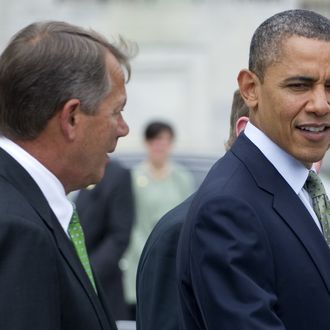
The Washington Post’s big story about the 2011 debt ceiling negotiations and the failed efforts to obtain a Grand Bargain is being hailed as a triumph of spin for John Boehner, and has sparked a concerted counterattack from the Obama administration. The story is a giant mess, with a conclusion that does not follow from the facts it presents. The story claims that Republicans told Obama they “might” accept a deal with $800 billion in higher tax revenue, in return for much larger spending cuts, if much or all of that revenue came in the form of assuming higher economic growth. Obama agreed, then floated a different and bigger deal, and then — when Republicans refused to return his calls — offered to take the previous deal, only to have Republicans turn him down flat because it was “too late.” The Post bizarrely frames this as Obama having blown the deal, without accounting for its own reporting that (1) the “deal” may have involved few and possible zero Republican concessions, (2) Republicans never fully agreed to it, and (3) it being “too late” was a Republican decision, not some fact of timing beyond anybody’s control.
On top of that, the Obama administration disputes that it ever accepted, or would have accepted, revenue in the form of “dynamic scoring” (that is, assuming that lower tax rates will increase growth and thereby increase revenue). In an item commenting on that story, I castigated the administration for having at least considered this offer, or having deemed it a sufficiently minor obstacle that it could negotiate through it. I should have noted that the administration strongly denies it would ever have agreed to dynamic scoring as any component of the higher revenue. I can’t say which side is right about what was offered here. Still, the deal the administration tried to make, even by its own account, was pretty bad.
Meanwhile, heroic truth-teller Glenn Greenwald attempts to process my criticism of Obama, and his brittle mind shatters into pieces:
In November, 2011, Jonathan Chait wrote an article for New York Magazine castigating liberals as “unreasonable” for failing to revere President Obama as much as Chait does. Today, Chait wrote an article entitled “How Obama Tried to Sell Out Liberalism in 2011” about a new Washington Post piece detailing the President’s attempts last year to massively cut Social Security and other entitlement programs without any new revenue. Chait concludes: “What the story actually shows is that Obama’s disastrous weakness in the summer of 2011 went further toward undermining liberalism than anybody previously knew.” This was the essence of Chait’s accusation back when he was in Obama-hagiography mode: “Liberals are dissatisfied with Obama because liberals, on the whole, are incapable of feeling satisfied with a Democratic president.” The Prime Progressive Pundit Principle: The permissible range of Obama criticism is precisely equal to the amount that I criticize Obama.
Now, in trying to understand Greenwald’s failed attempts at comprehension, a few reminders may be in order. He begins by referring to my essay on liberal disillusionment, which makes the following argument: Liberals are invariably disappointed with Democratic presidents because they hold them, contemporaneously, to an unreasonably high standard. All Democratic presidents make some bad decisions, and even when they attempt to do the right thing, they face strong obstacles to their goals. I argued that it’s fine and even good to criticize their wrong decisions, noted that I had done so myself on several occasions, but argued that an accurate perspective is needed.
Greenwald begins by presuming that there is a contradiction between that argument and my recent piece castigating Obama’s 2011 debt ceiling strategy. It’s just another Glenn Greenwald reading-comprehension problem.
But then, at the end of his item, Greenwald tries to fit together this apparent contradiction into something that can make sense in his worldview: “The Prime Progressive Pundit Principle: The permissible range of Obama criticism is precisely equal to the amount that I criticize Obama.”
The key word here is “permissible.” Greenwald is characteristically obsessed with the notion that people who disagree with him are engaged in an act of coercion. His opponents are always “thought enforcers” or warning critics they “must not dissent” or the like.
Obviously, though, I have made no attempt to limit the ability of anybody to disagree. I’m not saying what’s “permissible,” I’m just saying what I think is right. And if you remove that obviously nonsensical implication from Greenwald’s sentence, the logic collapses. Because then all he’s saying is that I agree with the criticisms of Obama that I agree with, and I disagree with the ones I disagree with. It’s sort of impressive that Greenwald manages to turn that into indignation fodder. I’m sure he only agrees with the Obama criticism he agrees with.
In any case, I haven’t “turned” on Obama in any fundamental way. I think he’s done a lot of great things, and also made some mistakes, the largest one being the connected decisions to hire Bill Daley as chief of staff, let the Republicans hold the economy hostage, and try to get them to agree to a balanced debt-reduction deal. I have criticized those decisions extensively. I’m relieved that Obama has concluded that strategy failed.






























